A colorful sunrise is reflected over the wetlands on December 27, 2014:

Now back to those eagles. You may remember that we have been following a local pair of Bald Eagles since they were "discovered" back in 2007. It was the first active nest to be recorded in Broward County, Florida in over 40 years. This was well before DDT was abolished after being recognized as a major contributor to the disastrous decline of the species.
The eagles attracted much attention from local residents, many of whom had no idea that this iconic species even resided in Florida, which now has over 1,500 nesting pairs. Over seven breeding seasons, ground observers documented that this pair produced at least 18 eaglets, of which only 4 failed to fledge. Facebook followers named the pair "Pride and Joy."
Tragically, Joy disappeared after October 30, 2014, and Pride was left alone. He often flew in circles above the nest, possibly to attract a mate, and continued to rearrange nesting materials:

All this changed on December 7, 2014, when an observer called me to say that she was quite certain she saw one eagle on the nest and immediately saw a second roosting nearby. She called again about 25 minutes later to report that an adult female was roosting near the nest and the male (Pride) was in the nest. I rushed over and got there at about 5:00 PM. A small crowd was already gathering in response to her Facebook alert.

The female was now roosting in the nest tree above and to the left (east) of the male in the nest. The male (Pride) kept looking up at her.

As is evident in this photo, the female eagle retains dark feathers in her head and tail. She is a young bird, probably about 3 1/2 years old. Usually a Bald Eagle's head turns pure white when it attains "fifth year" plumage after about 4 years of age:

Pride then took flight and landed next to the female and briefly attempted copulation after the female assumed a receptive posture.
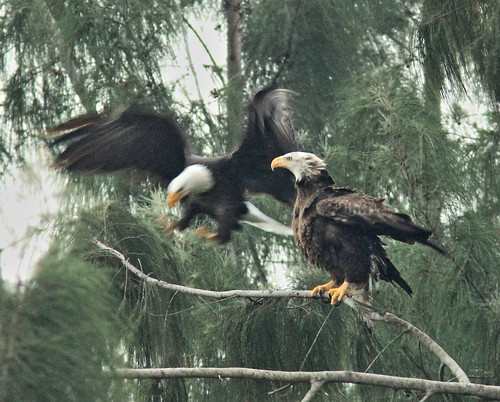

Soon both took flight (the female chasing the male) and circled the nest, over the wooded area and Pines Boulevard. Pride is noticeably smaller:

The new female may weigh 20 percent more than the male and has a greater wing span:

The male then roosted at the top of a pine just to the west of the nest and the female disappeared behind the nest. During the remainder of the month, more courtship was observed but the new female seemed never to have "broody" instincts. She rarely sat in the nest despite Pride's many attempts to lure her into it by bringing in food.
We assumed that she was simply not yet old enough to raise a family but were very encouraged to see that a pair bond was being established between Pride and "Jewel," as she came to be named. (To be continued next month...)
The month was not all about eagles, although their images occupied a large share of the 603 photos which I processed during December. Our back yard saw some action as a Wood Stork and a Great Egret hunted together. Each may have benefited from the association because of their different foraging strategies.
The Wood Stork is a tactile feeder which stirs the water with its foot and waits for prey to wander within the grasp of its open jaws. The egret hunts by sight and may help to locate prey concentrations. Fish stirred up by the stork may serve as food for the egret.
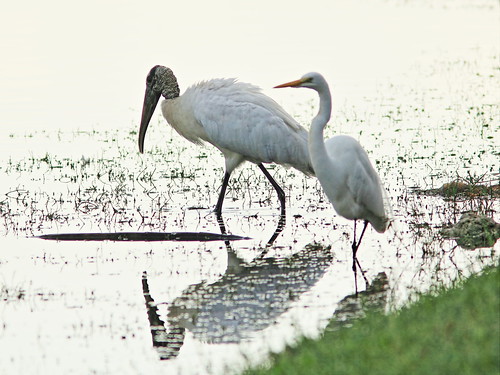
Here is a nice size comparison:

A small pond just off a busy roadway provided another comparison, between two large sandpipers, a Greater and a Lesser Yellowlegs. In this photo the greater size and bill length of the Greater (to the left) and the Lesser Yellowlegs species (dozing to the right) are evident. Six much smaller Lesser Sandpipers (which also have yellow legs) are resting in their midst.
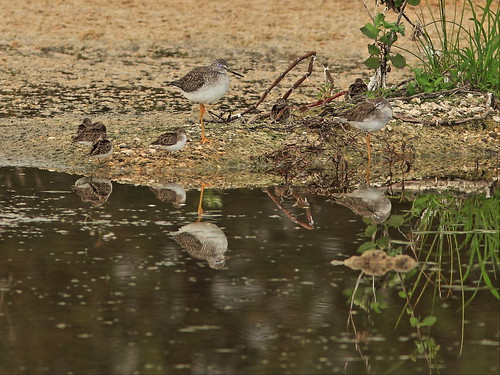
This photo illustrates that the longer bill of the Greater Yellowlegs is slightly upturned:
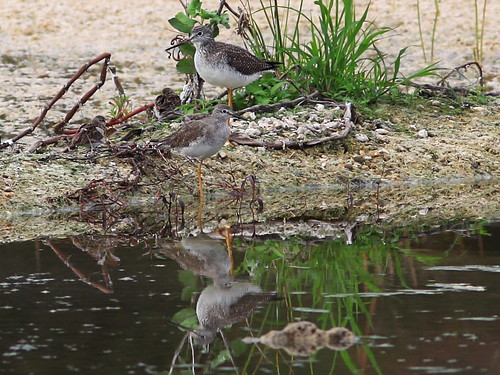
An exotic Purple (Gray-headed) Swamphen at nearby Chapel Trail preserve:

Also at Chapel Trail, a Mourning Dove rests on a fence:

Looking back on the eventful month, I realize that this was one of the last times we had flocks of Wood Storks on our lake. They since have abandoned their huge rookeries in the southern Everglades because of unfavorable climate and persistent high water levels which disperse their prey.
Usually they would have been raising their young at this time of year. One stork seemed to be particularly stressed. Oddly, it appeared on our back patio and acted abnormally tame. Had someone been feeding it?
The stork is looking into our back window (click for larger image):

Better views through the window:
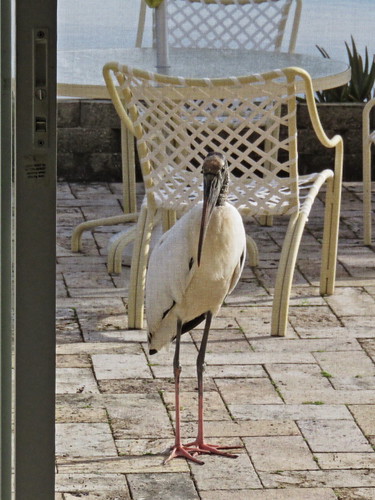

Its pink feet are an adaptation which makes them more visible as it agitates the water to frighten prey into the grasp of its bill:
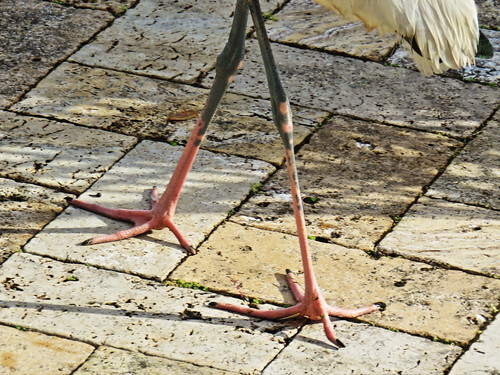
= = = = = = = = = = = = = = =
Linking to Misty's CAMERA CRITTERS,
Linking to Eileen's SATURDAY'S CRITTERS,
Linking to FENCES AROUND THE WORLD by Gosia
Linking to WEEKEND REFLECTIONS by James
Linking to BirdD'Pot by Anni
Linking to Wild Bird Wednesday by Stewart
Linking to Wordless Wednesday (on Tuesday) by NC Sue
Linking to ALL SEASONS by Jesh
________________________________________________
Please visit the links to all these memes to see some excellent photos on display
________________________________________________
Always love my visits with you.
ReplyDeleteThat was one friendly stork
'I am watching you!' I love the stork shots. fascinating post about eagles. looking forward to reading next months story.
ReplyDeleteGreat sky shot.
ReplyDeleteGreat post, I'm hooked and can't wait for more eagle adventures
ReplyDeleteAmazing eagle captures!! I like the way you go back in your archives to three years ago. I may have to start doing that. I have tons of photos, and I often forget what I have!
ReplyDeleteGreat eagle stories!
ReplyDeleteYou caught the precious moment of wild lives successfully and excellently. Thanks for sharing us. Happy days.
ReplyDeleteInteresting post! So glad the eagles have made a comeback.
ReplyDeleteAmazing birds!
ReplyDeleteThe eagles' story deserves following...
Hello Ken, beautiful sky capture. Awesome series on the Bald Eagles. It is always cool to see the eagle. Thank you for linking up and sharing your post. I appreciate your visit and comment too. Happy Saturday, enjoy your weekend.
ReplyDeleteEagles are very interesting birds, and yours are lovers - fantastic. And the first photo is really amazing! I like such twilight shots!
ReplyDeleteRegards from the snowy Berlin in Germany
Gabi
Oh my a stork.......on your patio?!!!! What a thrill that would be for me. Wow. And, Ken, I never EVER tire of reading about the eagle family....so wonderful to read and view.
ReplyDeleteThanks so much for joining us birders this weekend at I'd Rather B Birdin'. Your contribution is always so appreciated. Have a great week ahead...enjoy those birds!!!
I have never seen a wood stork. Interesting. Jealous of your Eagle shots. Enjoyable post. Happy Sunday.
ReplyDeleteSuperb photos!
ReplyDeleteGreat photos and an exciting story, thanks for sharing.
ReplyDeleteHave a nice time
Nice set of pictures. I hope to be able to get some Sea Eagle images in the up-coming holiday - but I've said that before I think!
ReplyDeleteCheers - Stewart M - Melbourne
Wow, interesting you could follow the process between Pride and Jewel! Did not know the female eagle(is that common?) has a bigger wingspan than the male! Thank you much for sharing these interesting details of the bald eagles with All Seasons!
ReplyDeleteYour comment about the "click and run" bloggers made me smile:) Have a great week!
Great sunrise and reflection. I especially like the clumps of reeds(?) in the foreground; they add interest to the scene.
ReplyDeleteHow exciting to watch the eagles as they prepare to raise a family! Glad Pride has found a mate.
ReplyDeleteThanks for sharing these marvelous photos at https://image-in-ing.blogspot.com/2017/12/at-dusk.html
Wow, these are awesome shots! I love all the eagle image--I would probably spend waaaay too much time watching them :)
ReplyDeleteThe Eagle news is so exciting! And I loved all your other photos as well. Wonderful post! Such a fun share.
ReplyDelete